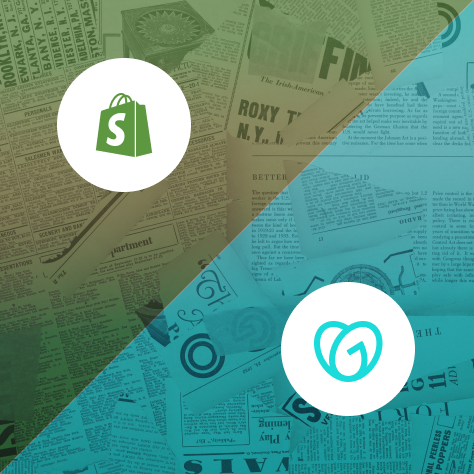Why Shopify Outperforms GoDaddy For Serious E-Commerce Brands In 2025
Choosing the right platform is one of the first decisions every ecommerce business makes. It affects everything from how products are displayed to how payments are processed.
In 2025, two names often come up: Shopify and GoDaddy. Both offer tools that help people sell products online, but the way they are built and what they prioritize are different.
This article compares Shopify and GoDaddy for ecommerce brands that want to grow. It explains the differences in their tools, customization options, and how well they handle more complex online businesses.
Shopify Vs GoDaddy Ecommerce Overview
For serious ecommerce brands in 2025, Shopify stands as the stronger platform compared to GoDaddy.
Shopify commands 10% of the global e-commerce platform market with 4,628,418 active stores worldwide, while GoDaddy powers only 154,455 stores with declining growth (-6% YoY). This stems from their fundamental difference: Shopify was built specifically for ecommerce, while GoDaddy added selling features to its website builder.
Shopify focuses entirely on helping businesses sell products. It includes tools for managing inventory, processing payments, and connecting with customers across different sales channels. Everything in the system supports selling products efficiently.
GoDaddy started as a domain registrar and website builder. Its ecommerce features came later and aren't as deeply integrated into the platform. The selling tools work, but they're more basic and have limitations when a store grows larger.
This core difference matters most when businesses start to expand. Shopify can handle more products, more customization, and more complex operations. GoDaddy works well for smaller shops but becomes restrictive as sales increase.
- Built for selling: Shopify's entire platform focuses on ecommerce, while GoDaddy offers ecommerce as just one feature among many.
- Growth potential: Shopify supports expanding businesses with advanced tools and integrations; GoDaddy works best for simpler stores.
- Feature depth: Shopify provides more detailed control over products, checkout, and store design than GoDaddy.
Pricing And Total Cost For Serious Sellers
Running an online store costs more than just the monthly subscription fee. Transaction fees, apps, themes and more all add to the total cost of operating an ecommerce business.
Shopify offers four main plans: Basic ($39/month), Grow ($105/month), Advanced ($399/month), and Plus ($2,300/month). Each includes core ecommerce features, with more tools and functionality added at higher levels. Every Shopify plan allows unlimited product listings.
GoDaddy's plans start lower at $9.99/month, but only the $29.99/month tier includes full ecommerce features. Lower-priced plans don't support online selling or offer very limited capabilities.
Transaction fees make a big difference in the real cost of running a store. Shopify doesn't charge extra transaction fees when using Shopify Payments. If you use other payment methods, fees start at 2% per transaction on the Basic plan.
GoDaddy Payments charges 2.3% + 30¢ per online transaction. For a store making $10,000 monthly, this difference can add up to hundreds of dollars.
The tools available for managing products and connecting with other services create major differences between these platforms. Shopify's app ecosystem includes 12,320+ specialized apps compared to GoDaddy's minimal add-ons, giving merchants significantly more tools for customization and growth.
Key Ecommerce Features And Integrations
The tools available for managing products and connecting with other services create major differences between these platforms.
Inventory Tools
Shopify's inventory system handles complex product catalogs with ease. It supports:
- Unlimited products and variants
- Bulk editing and CSV import/export
- Inventory tracking across multiple locations
- Automatic stock alerts
GoDaddy offers more basic inventory management. It works for small catalogs but struggles with large numbers of products or complex variations. Product options like sizes and colors have more limitations compared to Shopify.
Plugin And App Ecosystems
The ability to add new features through apps or plugins creates a significant advantage for Shopify. The Shopify App Store contains 10,000+ tools for everything from marketing to shipping to design.
GoDaddy has a much smaller selection of add-ons. This limits how much you can customize your store or add specialized functions as your business grows.
Popular Shopify integrations include email marketing tools like Klaviyo, shipping solutions like ShipStation, and optimization tools like Platter+ that improve conversion rates and checkout experiences.
Checkout Customization
The checkout process directly impacts sales completion rates. Shopify provides a customizable checkout with:
- Upsell and cross-sell opportunities
- Abandoned cart recovery
- Multiple payment options
- One-page or multi-step options
GoDaddy's checkout offers fewer customization options. The ability to add products during checkout, customize the flow, or implement advanced recovery tactics is more limited.
Customization And Theme Flexibility
How your store looks and functions affects customer experience and brand perception. Both platforms offer pre-designed themes, but with different levels of customization.
Shopify has a themes store with over 800 free and paid themes, designed specifically for ecommerce. These themes include product page layouts, collection displays, and mobile-responsive designs optimized for selling. Each theme can be customized to match brand colors, fonts, and layouts.
GoDaddy offers fewer theme options, and they're designed for general websites rather than specifically for ecommerce. This means less attention to product displays, shopping carts, and other selling-specific elements.
For deeper customization, Shopify uses a templating language they invented called Liquid. This allows access to the theme's code for custom modifications. GoDaddy restricts users to its drag-and-drop editor, which is easier to use but more limiting in what can be changed.
- Design flexibility: Shopify allows more control over how products display and how customers navigate the store.
- Mobile optimization: Both platforms create mobile-responsive sites, but Shopify themes are built with mobile shopping in mind.
- Brand consistency: Shopify provides more options for maintaining consistent branding throughout the shopping experience.
SEO And Marketing Capabilities
Getting found online and promoting products requires specific tools. The platforms differ in how they support these essential marketing functions.
Shopify includes comprehensive SEO tools like customizable meta tags, automatic sitemaps, and SEO-friendly URLs. Its blogging platform supports content marketing with categories, tags, and comments. These features help stores rank higher in search results.
GoDaddy offers basic SEO settings but with less control over elements like canonical tags, structured data, and URL formats. Its blogging capabilities are more limited, making content marketing more challenging.
For email marketing, Shopify includes Shopify Email with 2,500 free emails monthly. It also offers abandoned cart recovery emails and customer segmentation. GoDaddy has basic email marketing but fewer automation options.
Multichannel selling is increasingly important for growing brands. Shopify connects directly with Facebook, Instagram, Amazon, and other platforms. Products, inventory, and orders sync across channels. GoDaddy supports some social selling but with fewer integrations and less synchronization.
Payment And Shipping Options
The ability to accept payments and deliver products efficiently directly impacts sales and customer satisfaction.
Shopify supports over 100 payment gateways worldwide, including popular options like:
- Shopify Payments (powered by Stripe)
- PayPal
- Apple Pay
- Google Pay
- Amazon Pay
GoDaddy primarily supports its own payment system (GoDaddy Payments) and PayPal. This limits flexibility, especially for international selling or customers who prefer other payment methods.
For shipping, Shopify integrates with major carriers like UPS, FedEx, and USPS. It calculates real-time shipping rates, prints shipping labels in bulk, and allows for shipping rules based on weight, price, or location. GoDaddy offers more basic shipping options with fewer carrier integrations and manual label creation.
International selling becomes much easier with Shopify's built-in tools for multiple currencies, languages, and region-specific tax calculations. GoDaddy has limited international features, making global expansion more difficult.
Potential Scalability And Growth
How well a platform handles increased traffic, sales, and complexity determines whether it can support a growing business.
Shopify's infrastructure is built to handle high traffic volumes without slowing down. Its servers can manage traffic spikes during sales or product launches, maintaining consistent performance. For larger businesses, Shopify Plus offers enterprise-level features and dedicated support.
GoDaddy's platform works well for smaller stores but may struggle with higher traffic volumes or complex operations. Its system isn't designed specifically for large-scale ecommerce, which can create limitations as a business grows.
The ability to add new features and integrate with other business systems also affects scalability. Shopify's extensive app ecosystem allows stores to add specialized tools as needed. GoDaddy's limited integration options can restrict growth opportunities.
- Traffic handling: Shopify maintains performance during high-traffic periods; GoDaddy may slow down.
- Feature expansion: Shopify allows adding new capabilities through apps as business needs change.
- Enterprise support: Shopify offers specialized plans for larger businesses; GoDaddy doesn't have equivalent options.
Godaddy Vs Shopify Quick Note
When comparing popular website platforms, Shopify and GoDaddy each have distinct strengths and limitations.
Shopify excels as a dedicated ecommerce system with comprehensive selling tools, extensive customization options, and the ability to scale with business growth. It works best for businesses focused primarily on selling products online.
GoDaddy offers an easy-to-use website builder with basic ecommerce capabilities. It works well for simple stores with few products but lacks depth for more complex selling operations.
Who Wins For Serious Brands
For businesses focused on growth and long-term ecommerce success, Shopify consistently outperforms GoDaddy in key areas that matter most.
Shopify's advantages include its purpose-built ecommerce architecture, advanced inventory and product management, extensive app ecosystem, and ability to scale with business growth. Its checkout process, payment options, and shipping integrations provide more flexibility for optimizing the customer experience.
GoDaddy works well for businesses with simpler needs: few products, basic selling features, and limited growth expectations. Its strength lies in simplicity and ease of setup rather than advanced ecommerce capabilities.
The gap between the platforms becomes most apparent when stores grow beyond the basics. Adding product variations, implementing marketing automations, or expanding to new sales channels all prove easier on Shopify than on GoDaddy.
Unlock Your Store's Potential With Shopify
Shopify provides a foundation that supports both current sales and future growth. Its specialized ecommerce tools handle everything from inventory management to checkout optimization to marketing automation.
The platform's flexibility allows businesses to start simple and add complexity as they grow. New features can be added through apps without rebuilding the entire store, saving time and resources while improving results.
Platter works with Shopify stores to enhance performance and profitability. Our tools optimize the checkout experience and help increase average order value without requiring technical expertise or custom development.
Book a demo to explore how Platter can optimize your Shopify storefront
FAQs About Shopify Vs GoDaddy
How do I migrate from GoDaddy to Shopify?
Shopify provides built-in migration tools that can transfer products, customers, and orders from your GoDaddy store to Shopify, or you can hire a migration expert to handle the process for you.
Which platform is better for selling digital products?
Shopify offers more robust digital product tools, including secure file delivery, download limits, and specialized apps for digital products compared to GoDaddy's more basic digital selling features.
How do Shopify and GoDaddy compare for site speed with large product catalogs?
Shopify maintains faster loading times with large product catalogs due to its optimized infrastructure, while GoDaddy's performance typically decreases as product numbers increase.
Can I use my GoDaddy domain with a Shopify store?
Yes, you can connect any GoDaddy domain to your Shopify store by updating the domain's DNS settings, allowing you to keep your existing domain while using Shopify's ecommerce platform.
Does Shopify or GoDaddy offer better customer support for store owners?
Shopify provides 24/7 support from agents specifically trained in ecommerce issues, while GoDaddy offers general support that may not have the same depth of ecommerce expertise.






-min.webp)




.webp)

















.svg)


.svg)











.png)

%201.png)



.svg)
.svg)
